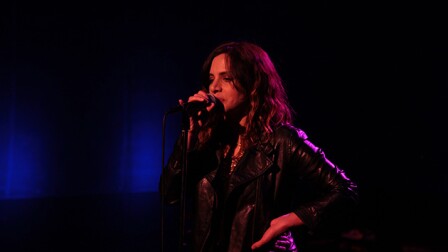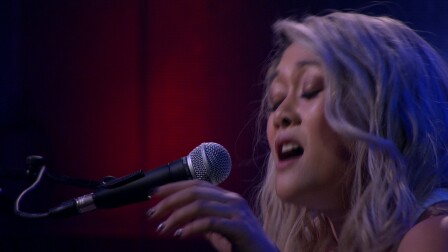
Ceci Bastida Goes Beyond Borders
The Tijuana-born, Los Angeles-based musician Ceci Bastida's recent sophomore album "La Edad de Violencia," mixes darker undertones with danceable beats. "I think that was also my way of finding hope," she says.
Bastida translates the title of her latest album-- "La Edad de Violencia"-- to "the age of violence." She wrote the songs while reading up on disturbing recent events. She was affected by stories about school shootings in the United States and news from Mexico. "I just couldn't find another title for the album that fit better than that," says Bastida, who was pregnant at the time she made the work. "I realized that most of the songs that I was writing talked about violence in different ways, whether it was violence against women or violence against students or kids or drug-related. It just kind of happened. It just seemed like the perfect title."
Bastida says that while her debut was quite polished, she wanted the follow-up was, intentionally, more raw. "There are a lot of times that I am off-key a little bit and I'm okay with it," she says.
"I feel like mistakes can make everything more interesting," she says, "because you see a lot of singers that sing perfectly, technically perfectly, but you can't really connect with them, sometimes, because it just sounds like any other perfect singer."

Politics have played a major role in Bastida's solo music, which takes roots in the band she first joined when she was just a teenager: Tijuana No!. Bastida remarks that politics played a role in shaping the band. Because they lived by the Mexico/U.S. border, Bastida says that they struggled with identity. "People would say that people from Tijuana want to be Americans," she explains. "I was kind of rejecting this idea that we were American and also rejecting certain things that we weren't, that we didn't like about our country and about our city and about the world around us."
She was only 15 when she was recruited a group of older kids in her Tijuana neighborhood to join her first band. Bastida agreed and spent a summer playing her small Casio with a group of pals. The line-up changed a little and the new group, Tijuana No!, started getting gigs. "There was never talk about making an album or touring," Bastida says. "Before we knew it, we were already signing with a label and we won a rock contest so it was fun because it was so organic."
Tijuana No! became a popular, and influential, band in the 1990s. The members drew inspiration from punk, reggae, ska, hard rock and indigenous music, folk and Trova. Their proximity to the United States allowed the members to travel easily; they were influenced by bands that they saw play in the U.S. They were also influenced by the politics of the mid-1990s. "I think it was an interesting time because everybody was wanting to change Mexico, sort of like what is happening right now, I think," she says. "But, people were very inspired and people were feeling like a community. People wanted to support each other and support these communities, so it was a great time."

Later in the decade, Bastida left the band. "I wasn't feeling 100 percent comfortable with what we were doing musically or lyrically," she says. Moreover, Bastida was quite young when she joined the band and wanted to explore other possibilities. She decided to continue her education in Tijuana and, ultimately, landed work teaching history, Spanish and English at a junior high school. Then another former Tijuana No! member, Julieta Venegas, asked her play keyboard for a few shows in the United States. "All of a sudden, I reconnected with music, which I hadn't done in a few years," she says.
Playing with Venegas was a good experience for Bastida, but, ultimately, she wanted to do her own thing. Bastida, who was living in Mexico City at the time, decided to head to Los Angeles. The move allowed her to connect with L.A. musicians. Meanwhile, she wasn't that far away from her family in Tijuana. Bastida released her first full-length solo album, "Veo la Marea," in 2010.
Despite her recent album's title, and some of the subject matter, Bastida says that she didn't set out to make a "dark" album. "I also like music that moves me and makes me want to dance," she says. "I think those things can be together. They don't necessarily have to be separate."








